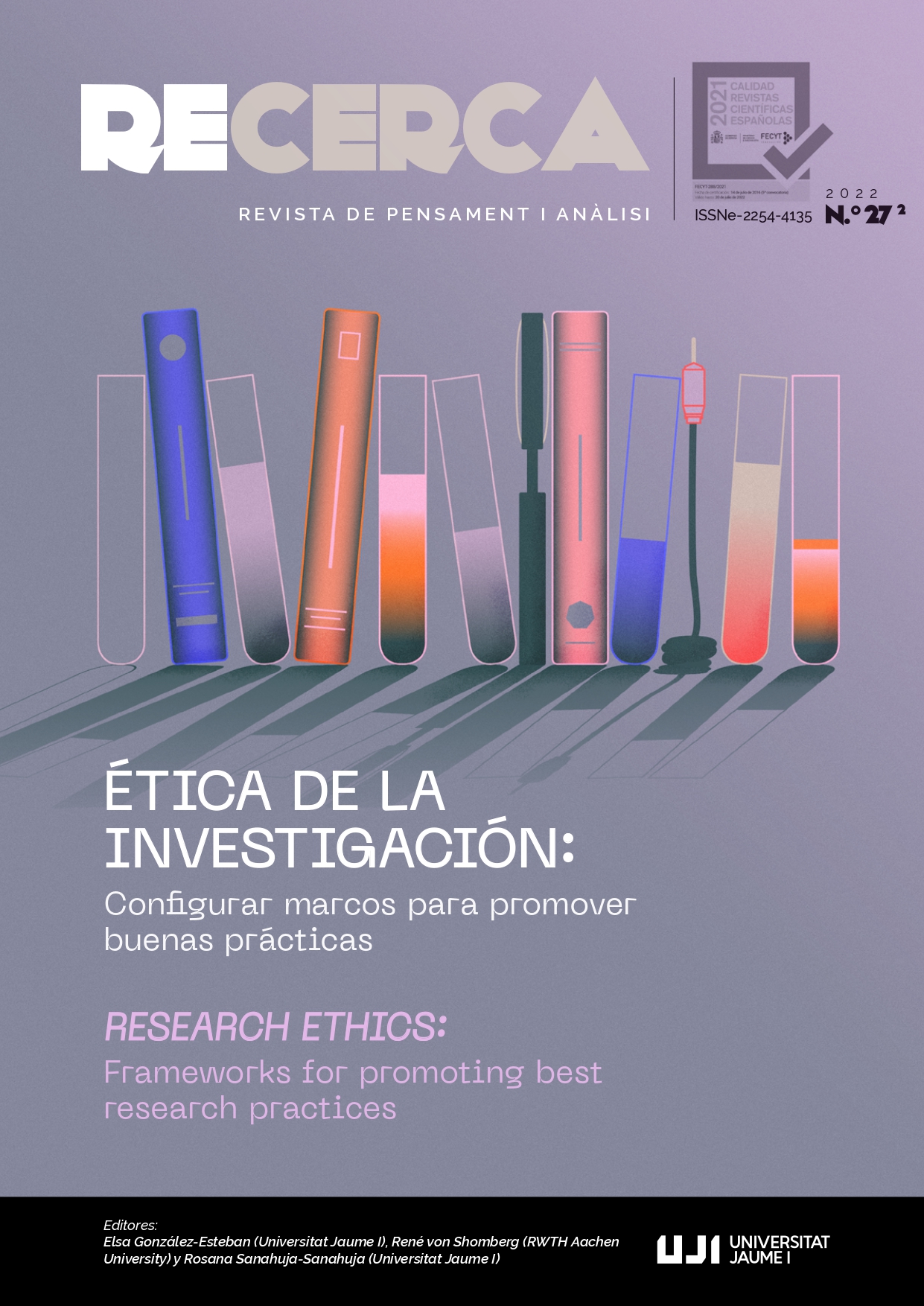The Kantian sense of respect as a normative core in social research in contexts of vulnerability
Main Article Content
Abstract
Social science research, whether observational or interventional, is confronted with situations where the dignity of participants and respect for cultural practices can be seriously affected. The aim of this article is twofold. Firstly, we will reflect on the ethical challenges facing social science research with special consideration of research in contexts of vulnerability. Secondly, we will propose the Kantian sense of respect as a normative framework to guide social science research.
Downloads
Article Details
References
Ansede, Manuel (2019, 30 de julio). Científicos españoles crean quimeras de humano y mono en China. El País.
Berche, Patrick y Lefrère, Jean Jacques (2010). The Tuskegee Syphilis Study. La Presse Médicale (1983), 39(12), 1324 1329. doi: https://doi.org/10.1016/j.lpm.2010.03.030
Berg, Anastasia (2021). Kant on Moral Respect. Archiv Fur Geschichte Der Philosophie, 1-31. doi: https://doi.org/10.1515/agph-2019-0022
Conill, Jesús (2016). Disposiciones de la naturaleza humana y autonomía moral en la filosofía práctica de Kant. Revista de Estudios Kantianos, 1(1), 11-23. doi: https://doi.org/10.7203/REK.1.1.7947
Cortina, Adela (1985). Razón comunicativa y responsabilidad solidaria. Salamanca: Sigueme.
Cortina, Adela (1986). Ética mínima. Madrid: Tecnos.
Cortina, Adela (1997). Ciudadanos del mundo. Hacia una teoría de la ciudadanía. Madrid: Alianza Editorial.
Cortina, Adela (2010). Justicia Cordial. Madrid: Trotta.
Cortina, Adela. (2007). Ética de la razón cordial. Educar en la ciudadanía. Oviedo: Ediciones Nobel.
Cortina, Adela. (2009). Las fronteras de la persona: el valor de los animales, la dignidad de los humanos. Madrid: Taurus.
Cortina, Adela y Conill, Jesús (1989). Estudio preliminar. En Kant (1797). La Metafísica de las Costumbres. Madrid: Tecnos.
Cortina, Adela, Conill, Jesús y García-Marzá, Domingo (eds.) (2008). Public Reason and Applied Ethics: The Ways of Practical Reason in a Pluralist Society. Hampshire: Ashgate Publishing.
Council for International Organizations of Medical Sciences in collaboration with the World Health Organization (2016). International Ethical Guidelines for Health-related Research Involving Humans. Biomedical Research. Recuperado de: http://www.sciencedirect.com/science/article/B6VC6 45F5X02 9C/2/e44bc37a6e392634b1cf436105978f01
Cragoe, Nicholas (2019). Oversight: Community vulnerabilities in the blind spot of research ethics. Research Ethics, 15(2), 1 15. doi: https://doi.org/10.1177/1747016117739936
Darwall, Stephen (1977). Two Kinds of Respect. Ethics, 88(1), 36-49.
Dávila, Johnny (2011). Algunas consideraciones sobre el sentimiento de respeto a la ley moral. Discusiones Filosóficas, 12(18), 145-154.
Dingwall, Robert, Iphofen, Ron, Lewis, Janet, Oates, John y Emmerich, Nathan (2017). Towards Common Principles for Social Science Research Ethics: A Discussion Document for the Academy of Social Sciences. Finding Common Ground: Consensus in Research Ethics Across the Social Sciences (Advances in Research Ethics and Integrity, vol. 1), 111-123. doi: https://doi.org/10.1108/s2398-601820170000001010
Dittmer, Cordula y Lorenz, Daniel (2018). Forschen im Kontext von Vulnerabilität und extremem Leid – Ethische Fragen der sozialwissenschaftlichen Katastrophenforschung 1. Katastrophenforschung : Eine szenische Darstellung, 19(3).
Erken, Arthur (2020). Against my will. Defying the practices that harm women and girls and undermine equality. State of World Population 2020. New York: UNFPA.
European Commission (2018). Ethics in Social Science and Humanities. Recuperado de: https://ec.europa.eu/info/sites/default/files/6._h2020_ethics-soc-science-humanities_en.pdf
Ezekiel, J. Emanuel y Weijer, Charles (2005). Protecting Communities in Research: From a New Principle to Rational Protections. Belmont Revisited: Ethical Principles for Research with Human Subjects.
Giorgini, Giovanni e Irrer, Elena. (2017). Roots fo respect. A Historic-Philosophical Itinerary. Berlin: De Gruyter.
Glasius, Marlies, Lange, Meta De, Bartman, Joss, Dalmasso, Emmanuela Lv, Aofei, Sordi, Adele Del, Michaelsen, Marcus y Ruijgrok, Kris (2018). Research, ethics and Risk in the authoritarian field. Cham: Palgrave Macmillan.
Göbel, Marie (2017). Respect as the Foundation of Human Rights: To What Extent Can This View Be Attributed to Kant? En Giorgini, Giovanni e Irrera, Elena (ed.). Roots of Respect (149-170). Berlin: De Gruyter.
Habermas, Jürgen (1968). Erkenntnis Und Interesse. Felix Meiner Verlag.
Habermas, Jürgen (1983). Moralbewusstsein und Kommunikatives Handeln. Frankfurt am Main: Shurkamp.
Kant, Immanuel (1785). Grundlegung zur Metaphysik der Sitten. Frankfurt am Main: Shurkamp.
Kant, Immanuel (1797). La metafísica de las costumbres. Madrid: Tecnos.
Kipnis, Kenneth (2001). Vulnerability in Research Subjects: A Bioethical Taxonomy. En Ethical and Policy Issues in Research Involving Human Participants, vol. 1, (576 580). Maryland. doi: https://doi.org/10.1159/000055866
Korsgaard, Christine (2009). Self-Constitution. Agency, Identity, and Integrity. Oxford: Oxford University Press.
Lozano, J. Félix y Escrich, Teresa (2017). Cultural Diversity in Business: A Critical Reflection on the Ideology of Tolerance. Journal of Business Ethics, 142(4), 679-696. doi: https://doi.org/10.1007/s10551-016-3113-y.
Marcuse, Herbert (1965). Repressive Toleranz. Kritik Der Reinen Toleranz, 91-128.
Milgram, Stanley (1974). Obedience to authority: An experimental view. New York: Harper and Row.
Morris, Nina (2015). Providing ethical guidance for collaborative research in developing countries. Research Ethics. doi: https://doi.org/10.1177/1747016115586759
Nussbaum, Martha (2000). Women and Human Development. Chicago: Cambridge University Press. doi: https://doi.org/10.1017/cbo9780511841286
Schadow, Steffi (2015). Achtung für das Gesetz. Moral und Motivation bei Kant. Kant Studien, 106(1), 160-164. doi: https://doi.org/10.1515/kant-2015-0017
Schroeder, Doris (2008). Dignity: Two riddles and four concepts. Cambridge Quarterly of Healthcare Ethics, 17(2), 230 238. doi: https://doi.org/10.1017/S0963180108080262
Schroeder Doris, Chatfield Kate, Muthuswamy, Vasanta y Kumar, Nandini (2020). Ethics Dumping – How not to do research in resource-poor settings, 1-22.
Schroeder, Doris y Bani-Sadr, Abol-hassan (2017). Dignity in the 21st Century Middle East and West SpringerBriefs in Philosophy. Recuperado de: https://link springer com.ezproxy.puc.cl/content/pdf/10.1007%2F978-3-319-58020-3.pdf
Schroeder, Doris, Chat, Kate, Singh, Michelle, Chennells, Roger y Herissone-kelly, Peter (2019). Equitable Research Partnerships. A Global Code of Conduct to Counter Ethics Dumping. Cham: Springer. Recuperado de: https://link.springer.com/book/10.1007%2F978-3-030-15745-6
Schroeder, Doris, Cook, Julie, Hirsch, François y Fenet, Solveig (2018). Ethics Dumping Case Studies from North- South Research. Cham: Springer.
Schroeder, Doris y Gefenas, Eugenijus (2009). Vulnerability: Too vague and too broad? Cambridge Quarterly of Healthcare Ethics, 18(2), 113-121. doi: https://doi.org/10.1017/S0963180109090203
Sen, Amartya (1999). Desarrollo y Libertad. Barcelona: Planeta.
Sen, Amartya (2006). Identity and Violence. New York: W. W. Norton and Company.
Sensen, Oliver (2011). Kant on human dignity. Göttingen: Walter de Gruyter.
Spitz, Vivien (2005). Doctors from Hell. Boulder: Sentien Publications.
Torralba, José Maria (2020). El sentimiento de respeto y la estructura del vínculo moral. Revista de Estudios Kantianos, 5(1), 174-191. doi: https://doi.org/10.7203/REK.1.1.7947
Zimbardo, Philip (2007). The Lucifer Effect: Understanding how good people turn evil. New York: Random House.


